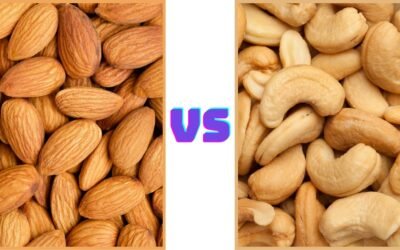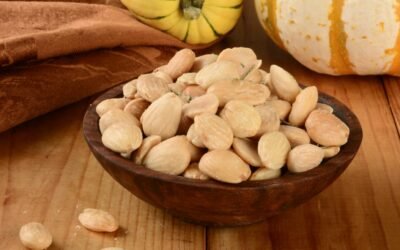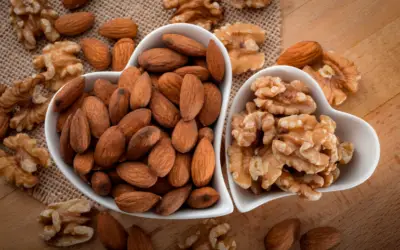
Should You Introduce Nuts To Your Baby?
Nuts are highly nutritious and beneficial for one’s health, but can babies consume nuts? This article addresses the question and provides ways on you can incorporate nuts into their diet, so read on to find out more.
Introducing nut earlier on may prevent nut allergies
Introducing nuts to infants may be beneficial as their immune system is still developing, and hence by feeding them nuts, the body will be able to recognize the nuts as “friendly”. This is compared with feeding them nuts at a later age, when your child’s immune system deems nuts as harmful and may overreact, causing an allergic reaction. It was revealed in a study published in the Journal of Allergy and Clinical Immunology, that infants in Israel who were fed peanuts very early had lower probabilities of developing peanut allergies. The prevalence rate was 0.17% compared to 1.4% in the US and 1.7% in the UK.
Health benefits of nuts
Walnuts contain omega-3 fatty acids that are beneficial for brain, heart, and eye health. Almonds have high protein and at content, as well as magnesium and phosphorous which are beneficial for muscles and bones, respectively. They also contain many other minerals, such as calcium, iron, folate, vitamin E and zinc. Cashew nuts contain a notable amount of copper, which is needed for a strong immune system, brain health and energy production. Cashew nuts also contain magnesium and manganese, which are needed for bone health. Peanuts may reduce the risk of developing heart illness and gallstones. Peanuts may help to reduce gallstones as they are related to lowering cholesterol levels. Peanuts also contain micronutrients such as zinc, copper, vitamin E and B. These micronutrients may help with your child’s heart health, brain health and metabolism.
When?
It is recommended to start feeding infants peanuts as soon as they can consume solid food, and that is as early as four to six months old. The key is also consistency, and they must be fed many times a week for several months according to Dr Jessica Hochman, a member of the scientific advisory board for Ready, Set, Food.
How?
Nut butters are a great way to start incorporating nuts into their diets. However, they can be too thick sometimes and hence it is advisable to ground them more or mix with water. You can spread a thin layer of nut butter onto a slice of banana or add them into oatmeal, baby food and yoghurt. Do note to start on a small amount of roughly ¼ teaspoon to see how your toddler will react to the nut butter. If there is no allergic reaction, you could increase the amount to ½ teaspoon the next time. You could also steam apples and walnuts, then puree them in a blender and add a dash of cinnamon powder.
Mixed Nuts Powder Recipe
This recipe is for babies over eight months. Before you mix the nuts together, ensure that your child is not allergic to each nut. You can add around ½ teaspoon to your child’s porridge, milk, or baby food.
Time needed: 25 minutes
Serving: ½ cup
What you need:
- ¼ cup each of almonds, cashews, pistachios, and walnuts
- 2 to 3 cardamom
- A few saffron strands
- A pinch of turmeric powder (optional)
Steps:
- Roast nuts (no oil) in a heated pan over low fire. Be careful not to burn the nuts.
- Roast the cardamom and saffron strands in the same way.
- Allow the nuts to cool completely.
- Grind the nuts and cardamom into a fine powder in a food processor.
- Pulse the nuts intermittently to prevent the powder from becoming oily.
- Finally, add saffron strands and turmeric powder and pulse again.
- The powder can be stored in an airtight container in the refrigerator for two months.
Do not feed whole nuts
Do also note, that you should not feed children less than five years of age whole nuts. According to Dr Florencia Segura, a board-certified pediatrician at Einstein Pediatrics, whole nuts can block the air passageway of children under 4 if they are not chewed totally and inhaled into the lungs. Children have died due to choking and hence giving whole nuts to your child under five poses serious risks.
Allergy
Some symptoms to look out for include skin itchiness or rashes, hives (mosquito bite look alike), swelling on lips and tongue, vomiting, diarrhoea etc. A tip is to have a pack of non-drowsy antihistamine like children’s Zyrtec with you, to prepare for any allergies should it happen. You should also monitor your child for up to six hours from consumption of nuts, to look out for symptoms of allergy. Consult a pediatrician immediately if you spot any symptoms.
Conclusion
Overall, nuts are highly beneficial for your child and the earlier you start preparing your child, the less you will have to worry in the future about them developing nut allergies. Consult the pediatrician and take a step of faith. You will thank yourself later.






